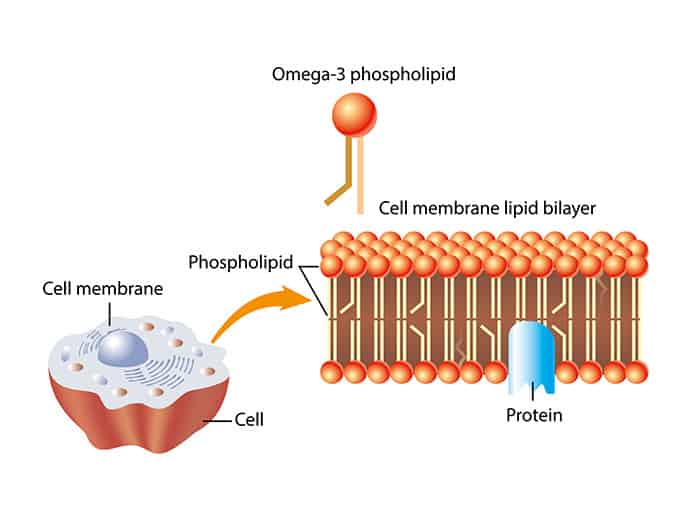

Have you ever heard of phosphatidylcholine or phosphatidylserine?
The names are long and complex, but the benefits are simple: brain optimisation.
Our brains need fats to function — We use them for everything from controlling blood flow to building neurotransmitters. Without access to fats, our brains quickly deteriorate.
One of the most important sources of fat-containing brain foods is the phospholipids.
Phospholipids are used primarily to slow the onset of age-related cognitive decline — such as Alzheimer’s or dementia and offer widespread benefits to all brains, even healthy ones.
In this article, we’re going to go over why phosphatidylserine and phosphatidylcholine are important.
We’ll break down the differences between the two and go over what the scientific community says about these nutritional nootropic supplements.
The Brain is Made of Fat

The brain is made up of about 60% fat by weight.[1]Chang, C. Y., Ke, D. S., & Chen, J. Y. (2009). Essential fatty acids and human brain. Acta Neurol Taiwan, 18(4), 231-41. Scientists can predict our cognitive integrity with impressive accuracy using the state of brain fat as the primary metric.
Poor fat distribution in the brain is associated with Alzheimer’s disease,[2]Morris, M. C., Evans, D. A., Bienias, J. L., Tangney, C. C., Bennett, D. A., Wilson, R. S., … & Schneider, J. (2003). Consumption of fish and n-3 fatty acids and risk of incident Alzheimer disease. Archives of neurology, 60(7), 940-946. multiple sclerosis,[3]Nightingale, S., Woo, E., Smith, A. D., French, J. M., Gale, M. M., Sinclair, H. M., … & Shaw, D. A. (1990). Red blood cell and adipose tissue fatty acids in mild inactive multiple sclerosis. Acta Neurologica Scandinavica, 82(1), 43-50. and various other neurodegenerative disorders.[4]Lukiw, W. J., & Bazan, N. G. (2008). Docosahexaenoic acid and the ageing brain. The Journal of nutrition, 138(12), 2510-2514.
Our brains require a steady supply of fat to thrive.
What Does the Brain Use Fat For?
Over half of the brain is fat, what is it for?
Some common applications of fats in the brain include:
- Cell membranes of neurons
- The myelin sheath insulates nerve fibres
- Chemical messengers (including leukotrienes, prostaglandins, and prostacyclin)
Fats: Food for the Brain
Like other organs, the brain is in a constant state of flux.
Cells are born, age, die, and are recycled — if they aren’t replaced, cognitive output begins to suffer.
Neurotransmitters and chemical messengers are created and destroyed — without them, we lose our ability to maintain neurochemical balance.
The myelin sheathing that insulates electrical impulses from our nerves needs to be replaced from time to time — if not, they “short out”, which is what happens with multiple sclerosis.
To support this flux, we need a steady stream of raw ingredients.
We can manufacture some fatty precursors ourselves from food, others we cannot.
Perhaps the most important group of fatty precursors concerning the brain are the phospholipids.
What are Phospholipids? What Makes Them so Important?
Phospholipids are part phosphorous, part fatty acid (often essential fatty acids), and part amino acid (building blocks for proteins).
They’re nutritional powerhouses for the brain — releasing raw materials that directly support the brain’s heavy nutritional requirements.
Two phospholipids in particular are important for optimising brain health:
1. Phosphatidylserine
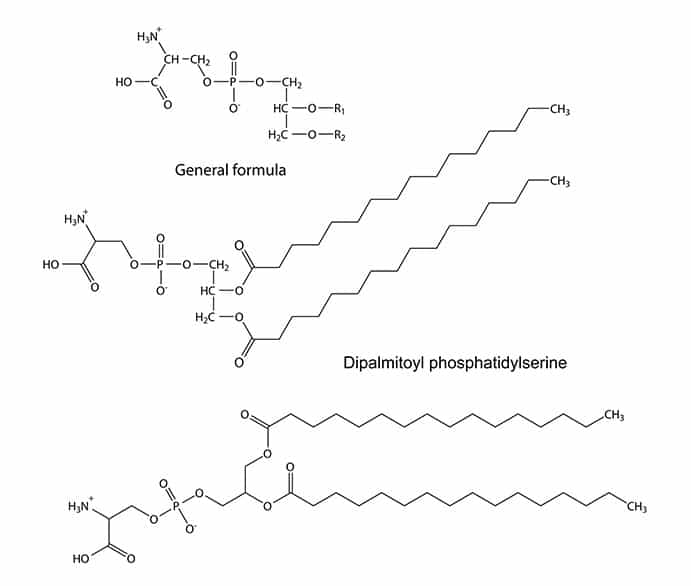
Phosphatidylserine is a molecule consisting of phosphorous, a fatty acid, and L-serine — an amino acid and key precursor for the manufacture of cell membranes.
What are the benefits of phosphatidylserine?
Phosphatidylserine plays a role in keeping the mind sharp as we age. It’s naturally produced in the body, but we produce less as we age.
We use phosphatidylserine for functions such as cell signalling, cell fluidity, and modulating neurotransmitter levels.
Over time, phosphatidylserine supplementation provides a gradual improvement in a variety of cognitive metrics including memory,[5]Crook, T. H., Tinklenberg, J., Yesavage, J., Petrie, W., Nunzi, M. G., & Massari, D. C. (1991). Effects of phosphatidylserine in age‐associated memory impairment. Neurology, 41(5), 644-649.[6]Calderini, G., Aporti, F., Bellini, F., Bonetti, A. C., Teolato, S., Zanotti, A., & Toffano, G. (1985). Pharmacological Effect of Phosphatidylserine on Age‐Dependent Memory Dysfunction. Annals of the New York Academy of Sciences, 444(1), 504-506. stress resistance,[7]Hellhammer, J., Hero, T., Franz, N., Contreras, C., & Schubert, M. (2012). Omega-3 fatty acids administered in phosphatidylserine improved certain aspects of high chronic stress in men. Nutrition research, 32(4), 241-250. and acetylcholine levels.[8]Pedata, F., Giovannelli, L., Spignoli, G., Giovannini, M. G., & Pepeu, G. (1985). Phosphatidylserine increases acetylcholine release from cortical slices in aged rats. Neurobiology of aging, 6(4), 337-339.
It’s also proven to slow the progression of neurodegenerative diseases like Alzheimer’s and dementia.[9]Calderini, G., Aporti, F., Bellini, F., Bonetti, A. C., Teolato, S., Zanotti, A., & Toffano, G. (1985). Pharmacological Effect of Phosphatidylserine on Age‐Dependent Memory Dysfunction. Annals of the New York Academy of Sciences, 444(1), 504-506.
The trick to using it effectively is to use it regularly for long periods.
Suggested uses of phosphatidylserine:
- Supports ADD/ADHD
- Enhances or optimises overall cognitive function
- Reduces the negative effects of stress
- Slows the onset of Alzheimer’s disease
- Improve learning and memory
- Improves our ability to resist the adverse effects of stress
How does it work?
Our brains make phosphatidylserine naturally — it can be found in abundance in the brain, lungs, testes, kidneys, liver, bones, heart, and our bloodstream.[10]Folch, J. (1942). Brain cephalin, a mixture of phosphatides. Separation from it of phosphatidyl serine, phosphatidyl ethanolamine, and a fraction containing an inositol phosphatide. Journal of Biological Chemistry, 146(1), 35-44.
It’s believed to provide fluidity for the cells, especially nerve cells. Fluidity in the cell membrane improves the cells’ ability to send signals and communicate with other parts of the body.
It plays a major role in the process of apoptosis—programmed cell death.[11]Vermes, I., Haanen, C., Steffens-Nakken, H., & Reutellingsperger, C. (1995). A novel assay for apoptosis flow cytometric detection of phosphatidylserine expression on early apoptotic cells using fluorescein labelled annexin V. Journal of immunological methods, 184(1), 39-51.
Apoptosis is important because the body uses it to tell cells that are either sick or worn out to self-destruct and make room for healthy cells to take their place.
Where does it come from?
We can get phosphatidylserine from the brains of mammals, such as cows or sheep, however, most of the phosphatidylserine on the market is manufactured from soy.
What’s the dose?
The typical dose of phosphatidylserine is 100 mg taken 3 or 4 times per day.
Like other nutritional nootropics, you must take this supplement over long periods. Concentrations of phosphatidylserine take a few weeks to build up in the brain before they start delivering benefits.
It also tends to offer a deeper, longer-lasting change in cognitive function than more direct nootropics such as Noopept or Piracetam.
You can expect 2 or 3 weeks of steady use before you start to notice any benefits. These benefits often remain for 6-12 months after stopping the supplement.
Buy Phospholipids Online Review Comparison Table
| Product | Company | Quantity | Price | Country | Website |
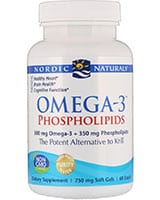 Phosphatidylserine | iHerb | 60 pills (750mg) | $33.96 |  Worldwide, AU | Visit Website >> |
2. Phosphatidylcholine
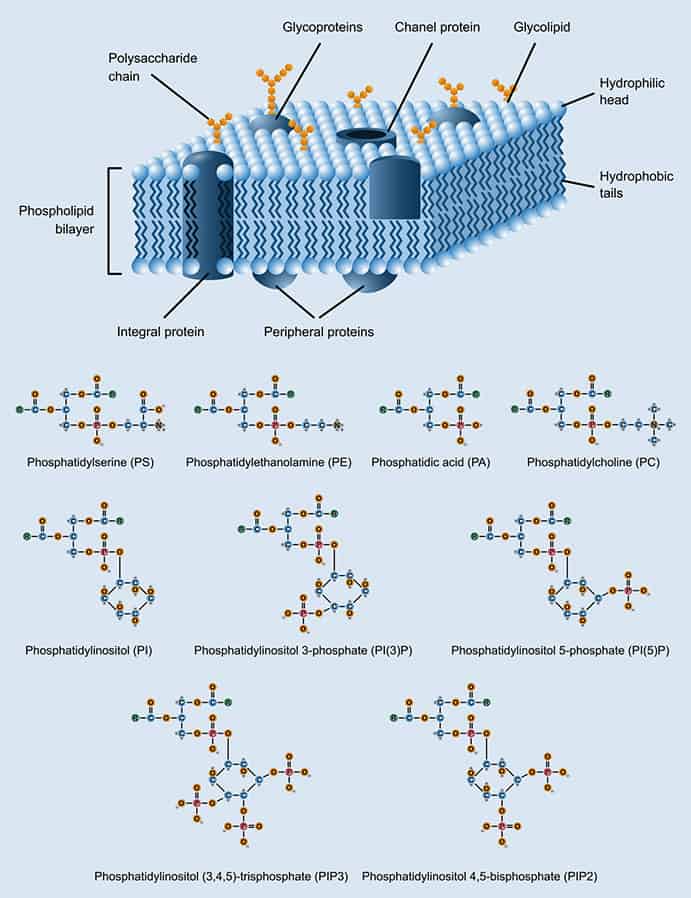
Phosphatidylcholine is very similar in structure to phosphatidylserine, only instead of an L-serine group, it contains a choline chemical group.
Low levels of phosphatidylcholine are associated with Alzheimer’s disease,[12]Mulder, C., Wahlund, L. O., Teerlink, T., Blomberg, M., Veerhuis, R., Van Kamp, G. J., … & Scheffer, P. G. (2003). Decreased lysophosphatidylcholine/phosphatidylcholine ratio in cerebrospinal fluid in Alzheimer’s disease. Journal of neural transmission, 110(8), 949-955. and schizophrenia.[13]Schwarz, E., Prabakaran, S., Whitfield, P., Major, H., Leweke, F. M., Koethe, D., … & Bahn, S. (2008). High throughput lipidomic profiling of schizophrenia and bipolar disorder brain tissue reveals alterations of free fatty acids, phosphatidylcholines, and ceramides. Journal of proteome research, 7(10), 4266-4277.
What are the benefits of phosphatidylcholine?
The brain uses the phospholipid as a building block for cell membranes and the myelin around nerve cells.
The choline molecules are stripped off and used to build neurotransmitters such as acetylcholine — a critical component of learning and memory.
Suggested uses of phosphatidylcholine
- Protects the cardiovascular system
- Slows the progression of Alzheimer’s disease
- Reduces age-related memory decline
- Injectable forms are used to treat Eczema
- Reduces symptoms of Tardive dyskinesia
- Lowers serum cholesterol levels
Where does it come from?
Like phosphatidylserine, we produce this compound in the body naturally, however, supplemental forms remain useful for boosting the concentrations of this compound in the brain — which provides a range of improvements to overall cognitive function.
One of the best sources of phosphatidylcholine is eggs, but we also find it in foods such as soybeans, mustard, and sunflower seeds.
Lecithin, a well-known health supplement is a larger molecule containing phosphatidylcholine. When lecithin breaks down in the body, it releases a phosphatidylcholine molecule into the bloodstream where it travels to the brain.
What’s the dose?
The typical dose of phosphatidylcholine is 500–4000 mg per day, usually divided into 2 or 3 doses throughout the day.
Similar to other nootropic phospholipids, phosphatidylcholine should be taken regularly over long periods before any benefits are experienced.
Buy Phosphatidylcholine Online Review Comparison Table
| Product | Company | Quantity | Price | Country | Website |
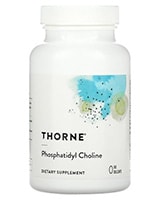 Phosphatidylcholine | iHerb | 60 pills (420mg) | $30.00 |  Worldwide, AU | Visit Website >> |
Buy CDP Choline Online Review Comparison Table
| Product | Company | Quantity | Price | Country | Website |
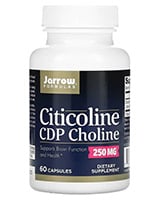 CDP Choline | iHerb | 60 pills (250mg) | $22.26 |  Worldwide, AU | Visit Website >> |
Does Scientific Research Support the Use of Phospholipids for Cognitive Enhancement?
There’s been an increase in interest in phospholipids in recent years as a potential treatment for neurological conditions like multiple sclerosis, Alzheimer’s disease, anxiety, and depression.
Age-related memory loss
A study published in 1991 involving 149 patients with age-related memory decline were given either 100 mg phosphatidylserine or a placebo for 12 weeks. Researchers noted an improvement in both learning and memory in the treatment group. They concluded that “[phosphatidylserine] may be a promising candidate for treating memory loss later in life”.
Animal studies involving aging rats were given phosphatidylserine at a daily dose of 15-50 mg/kg. Researchers noted that rats given phospholipids showed a lower rate of cognitive decline as the rats got older.[14]Calderini, G., Aporti, F., Bellini, F., Bonetti, A. C., Teolato, S., Zanotti, A., & Toffano, G. (1985). Pharmacological Effect of Phosphatidylserine on Age‐Dependent Memory Dysfunction. Annals of the New York Academy of Sciences, 444(1), 504-506.
Alzheimer’s Disease
One of the primary treatment aims for Alzheimer’s disease is to inhibit an enzyme responsible for breaking down the memory-associated neurotransmitter acetylcholinesterase.[15]Shintani, E. Y., & Uchida, K. M. (1997). Donepezil: an anticholinesterase inhibitor for Alzheimer’s disease. American journal of health-system pharmacy, 54(24), 2805-2810. Research proved that cell membranes high in phosphatidylserine correlate with a natural downregulation of the enzyme, supporting optimal levels of acetylcholine in the brain and slowing the onset of Alzheimer’s disease.[16]Tsakiris, S., & Deliconstantinos, G. (1984). Influence of phosphatidylserine on (Na++ K+)-stimulated ATPase and acetylcholinesterase activities of dog brain synaptosomal plasma membranes. Biochemical Journal, 220(1), 301-307.
ADD/ADHD
36 children between the ages of 4 and 14 with ADHD were given either 200 mg phosphatidylserine or a placebo for 2 months. At the end of the study, researchers concluded that the group treated with phosphatidylserine showed a significant reduction in ADHD symptoms and improved short-term memory compared to the placebo group.[17]Hirayama, S., Terasawa, K., Rabeler, R., Hirayama, T., Inoue, T., Tatsumi, Y., … & Jäger, R. (2014). The effect of phosphatidylserine administration on memory and symptoms of attention‐deficit hyperactivity disorder: a randomised, double‐blind, placebo‐controlled clinical trial. Journal of human nutrition and dietetics, 27, 284-291.
Conclusion
The brain contains a high concentration of fat. This fat is used to manufacture new cells, control the transmission of electrical impulses, build neurotransmitters, and regulate cellular communication.
One of the key areas of focus nootropics manufacturers use to optimise brain health is the addition of fatty acids and phospholipids. They’re used by healthy individuals to protect the brain from cognitive decline and maintain a high level of cognitive output.
These fatty molecules certainly deserve more attention. These nutritional nootropics are even more popular among the elderly for their role in offsetting age-related memory loss and Alzheimer’s disease.
Originally posted on January 7, 2019, last updated on March 31, 2024.
References
| ↑1 | Chang, C. Y., Ke, D. S., & Chen, J. Y. (2009). Essential fatty acids and human brain. Acta Neurol Taiwan, 18(4), 231-41. |
|---|---|
| ↑2 | Morris, M. C., Evans, D. A., Bienias, J. L., Tangney, C. C., Bennett, D. A., Wilson, R. S., … & Schneider, J. (2003). Consumption of fish and n-3 fatty acids and risk of incident Alzheimer disease. Archives of neurology, 60(7), 940-946. |
| ↑3 | Nightingale, S., Woo, E., Smith, A. D., French, J. M., Gale, M. M., Sinclair, H. M., … & Shaw, D. A. (1990). Red blood cell and adipose tissue fatty acids in mild inactive multiple sclerosis. Acta Neurologica Scandinavica, 82(1), 43-50. |
| ↑4 | Lukiw, W. J., & Bazan, N. G. (2008). Docosahexaenoic acid and the ageing brain. The Journal of nutrition, 138(12), 2510-2514. |
| ↑5 | Crook, T. H., Tinklenberg, J., Yesavage, J., Petrie, W., Nunzi, M. G., & Massari, D. C. (1991). Effects of phosphatidylserine in age‐associated memory impairment. Neurology, 41(5), 644-649. |
| ↑6, ↑9, ↑14 | Calderini, G., Aporti, F., Bellini, F., Bonetti, A. C., Teolato, S., Zanotti, A., & Toffano, G. (1985). Pharmacological Effect of Phosphatidylserine on Age‐Dependent Memory Dysfunction. Annals of the New York Academy of Sciences, 444(1), 504-506. |
| ↑7 | Hellhammer, J., Hero, T., Franz, N., Contreras, C., & Schubert, M. (2012). Omega-3 fatty acids administered in phosphatidylserine improved certain aspects of high chronic stress in men. Nutrition research, 32(4), 241-250. |
| ↑8 | Pedata, F., Giovannelli, L., Spignoli, G., Giovannini, M. G., & Pepeu, G. (1985). Phosphatidylserine increases acetylcholine release from cortical slices in aged rats. Neurobiology of aging, 6(4), 337-339. |
| ↑10 | Folch, J. (1942). Brain cephalin, a mixture of phosphatides. Separation from it of phosphatidyl serine, phosphatidyl ethanolamine, and a fraction containing an inositol phosphatide. Journal of Biological Chemistry, 146(1), 35-44. |
| ↑11 | Vermes, I., Haanen, C., Steffens-Nakken, H., & Reutellingsperger, C. (1995). A novel assay for apoptosis flow cytometric detection of phosphatidylserine expression on early apoptotic cells using fluorescein labelled annexin V. Journal of immunological methods, 184(1), 39-51. |
| ↑12 | Mulder, C., Wahlund, L. O., Teerlink, T., Blomberg, M., Veerhuis, R., Van Kamp, G. J., … & Scheffer, P. G. (2003). Decreased lysophosphatidylcholine/phosphatidylcholine ratio in cerebrospinal fluid in Alzheimer’s disease. Journal of neural transmission, 110(8), 949-955. |
| ↑13 | Schwarz, E., Prabakaran, S., Whitfield, P., Major, H., Leweke, F. M., Koethe, D., … & Bahn, S. (2008). High throughput lipidomic profiling of schizophrenia and bipolar disorder brain tissue reveals alterations of free fatty acids, phosphatidylcholines, and ceramides. Journal of proteome research, 7(10), 4266-4277. |
| ↑15 | Shintani, E. Y., & Uchida, K. M. (1997). Donepezil: an anticholinesterase inhibitor for Alzheimer’s disease. American journal of health-system pharmacy, 54(24), 2805-2810. |
| ↑16 | Tsakiris, S., & Deliconstantinos, G. (1984). Influence of phosphatidylserine on (Na++ K+)-stimulated ATPase and acetylcholinesterase activities of dog brain synaptosomal plasma membranes. Biochemical Journal, 220(1), 301-307. |
| ↑17 | Hirayama, S., Terasawa, K., Rabeler, R., Hirayama, T., Inoue, T., Tatsumi, Y., … & Jäger, R. (2014). The effect of phosphatidylserine administration on memory and symptoms of attention‐deficit hyperactivity disorder: a randomised, double‐blind, placebo‐controlled clinical trial. Journal of human nutrition and dietetics, 27, 284-291. |

Leave a Reply